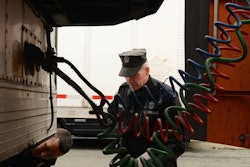Two Canadian truck drivers were among 19 people charged as members of an international organized crime syndicate for allegedly trafficking and importing cocaine and other controlled substances from Mexico into the United States and Canada. Ten were arrested in multiple cities this week following two federal indictments in the alleged scheme, which directed illegal narcotics through Los Angeles for export to Canada or re-distribution throughout the United States.
Authorities executed arrest and search warrants on Tuesday, Jan. 30, with a coalition of international law enforcement partners in various cities, including Los Angeles and Sacramento, California; Miami; Odessa, Texas; and the Canadian cities of Montreal, Toronto and Calgary.
In addition to those arrested, two defendants were already in state custody, and seven defendants are fugitives, including three Mexican citizens who allegedly supplied wholesale quantities of narcotics to the traffickers in the U.S. and Canada.
The investigation, known as “Operation Dead Hand,” resulted in two federal grand jury indictments, which collectively charge 19 individuals for their alleged roles in the organized crime syndicate. The syndicate, prosecutors allege, includes Mexico-based suppliers who brought large quantities of narcotics into the U.S., U.S. distributors, a Canadian who led an exportation organization, Canadian-based truck drivers who operate in the United States, and a large-scale Canadian trafficker and Italian organized crime figure, Robert Scoppa, whom investigators allege purchased massive quantities of drugs on a wholesale basis.

Investigators developed information indicating the organized crime group used Canadian “handlers” and “dispatchers” who traveled from Canada to Los Angeles for short amounts of time. The handlers coordinated the pick-up and delivery of large shipments of cocaine and methamphetamine, which were loaded onto long-haul trucks destined for Canada.
Wholesale quantities of fentanyl were seized as a result of the investigation. The transportation was coordinated by a network of drivers working with dozens of trucking companies who made numerous border crossings from the United States to Canada via the Detroit Windsor Tunnel, the Buffalo Peace Bridge, and the Blue Water Bridge, according to the indictments.
[Related: State troopers indicted in CDL test bribery scheme]
The indictments allege illicit drug trafficking activity cumulatively involving approximately 845 kilograms (1,860 pounds) of methamphetamine, 951 kilograms (2,092 pounds) of cocaine, 20 kilograms (44 pounds) of fentanyl and four kilograms (nearly nine pounds) of heroin. More than $900,000 in cash was seized during the investigation. The estimated wholesale value of the narcotics seized was between $16 and $28 million.
The investigation led to two separate indictments.
U.S. v. Sandoval is an 18-count indictment that charges 10 defendants, including the two Canadian truck drivers, for their roles in an organization that allegedly began operating on an unknown date and continued to about March 2023. They're charged with two drug trafficking conspiracies; conspiracy to import cocaine; drug exportation conspiracy; distribution/possession with intent to distribute controlled substances; possession of a firearm in furtherance of drug trafficking and being a felon in possession of ammunition.
The defendants charged in this indictment:
Jesus Ruiz Sandoval Jr., 45, John Joe Soto, 42, and Eduardo Carvajal, 50, all of Guadalajara, Mexico; Roberto Scoppa, 55, of Montreal, Canada; Ayush Sharma, 25, of Brampton, Canada; Subham Kumar, 29, of Calgary, Canada; Carlos Barragan, 51, of Long Beach, California; Corell Carbajal Garcia, 38, of Hemet, California; Humberto Luis Bermejo, 26, of Odessa, Texas; and Esteban Sinhue Mercado, 24, of San Jacinto, California.
Sandoval Jr., currently a fugitive, is believed to be a large-scale drug trafficker importing drugs from Mexico into the United States for distribution. Soto is believed to work under Sandoval. Carvajal, also an alleged large-scale drug-trafficker, is believed to export drugs from the United States to Canada. Scoppa is an alleged Canadian drug trafficker with close ties to an Italian organized crime family in Montreal. Barragan is an alleged drug trafficker who lives in the United States. Sharma and Kumar are truck drivers involved in exporting drugs to Canada.
[Related: $10M in drugs hidden in load at border: Latest bust]
The other indictment, U.S. v. Sidhu, includes 23 counts charging nine defendants for their roles in a criminal enterprise operating from at least September 2020 through February 2023, prosecutors allege. In addition to a drug trafficking conspiracy, the indictment alleges a drug exportation conspiracy and substantive counts of distribution/possession with intent to distribute controlled substances.
The defendants charged in this indictment:
Guramrit Sidhu, 60, of Brampton, Canada; Ivan Gravel Gonzalez, 32, a resident of both the Dominican Republic and Montreal, Canada; Daniel Antonio Trejo Huerta, 43, of Riverside, California; Ignacio Lopez, 53, a resident of Santa Ana, California; Daniel Joseph Alan Herrera, 27, of Miami; Orlando Velasco Jr., 29, of Stanton, California; Angel Larry Sandoval, 32, of Bell Gardens, California; Jorge Pina Nicols, 22, of Long Beach, California; and Bryan Ureta Valenzuela, 24, of Ontario, California.
Sidhu is alleged to have orchestrated the trafficking and exportation of large quantities of controlled substances to Canada working with several co-defendants described as suppliers. Gonzalez is alleged to be part of Sidhu’s exportation team based in the United States. Sidhu, also known as “King,” is charged with one count of engaging in a continuing criminal enterprise. According to the indictment, Sidhu occupied a position of organizer, supervisor and manager, and in this role obtained substantial income and resources.
If convicted, each defendant would face maximum penalties ranging from 40 years to life in federal prison. If convicted, Sidhu would face a mandatory minimum penalty of 20 years in prison. If convicted, Sandoval and Carvajal each would face a mandatory minimum penalty of 15 years in prison.
Investigation is ongoing by a series of international law enforcement partners including the FBI, the Los Angeles Police Department and the Los Angeles Interagency Metropolitan Police Apprehension Crime Task Force (LA IMPACT), the Royal Canadian Mounted Police, U.S. Customs and Border Protection, and law enforcement authorities in Mexico. Significant assistance was provided by Homeland Security Investigations and the Drug Enforcement Administration.
The Justice Department’s Office of International Affairs; the FBI’s Legal Attaché Offices in Mexico City, Ottawa and New Delhi; and the FBI Field Offices in Miami, El Paso and Buffalo provided substantial assistance and support.
Operation Dead Hand is part of an Organized Crime Drug Enforcement Task Forces (OCDETF) investigation. OCDETF is intended to identify, disrupt, and dismantle the highest-level drug traffickers, money launderers, gangs and transnational criminal organizations that threaten the United States.
[Related: Cocaine in Mex driver's trailer axles: Texas cops]









